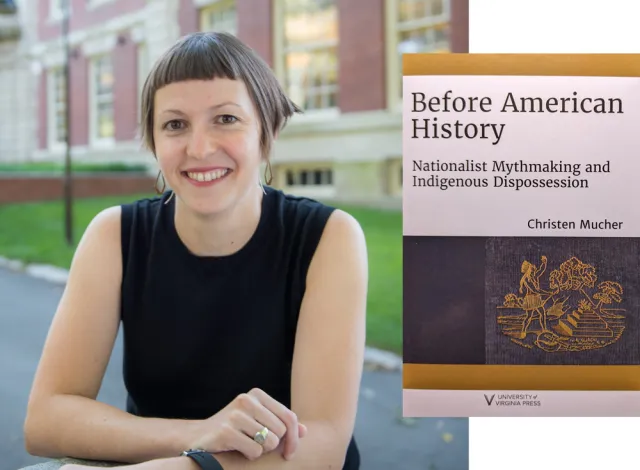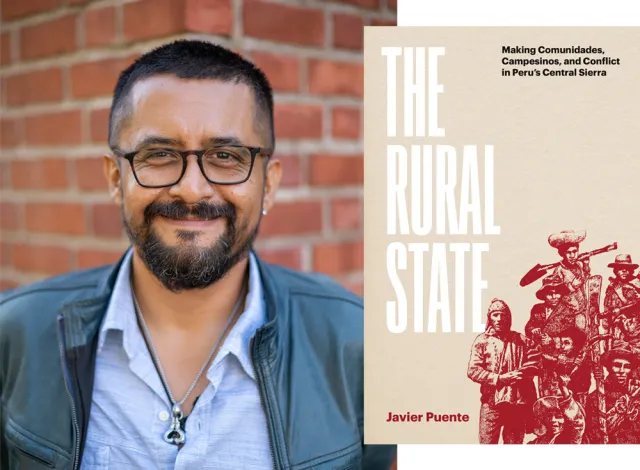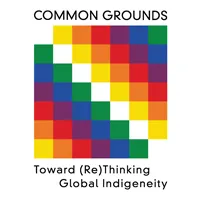A Publication Celebration: Christen Mucher’s and Javier Puente’s New Books
Published March 17, 2023
The Boutelle-Day Poetry Center, 4-5:30 p.m., April 11, 2023
“Original, compelling, and deeply researched,” “meticulous,” “impressive,” “groundbreaking”—these are a few of the ways reviewers have described Christen Mucher’s and Javier Puente’s new books. Come find out why at an early evening reception with comments by the authors and refreshments for attendees.

Christen Mucher’s Before American History: Nationalist Mythmaking and Indigenous Dispossession (University of Virginia Press) juxtaposes Mexico City’s famous carved Sun Stone with the mounded earthworks found throughout the Midwestern states of the U.S. to examine the project of settler nationalism from the 1780s to the 1840s in two North American republics usually studied separately. As the U.S. and Mexico transformed from European colonies into independent nations—and before war scarred them both—antiquarians and historians compiled and interpreted archives meant to document America’s Indigenous pasts. These settler-colonial understandings of North America’s past deliberately misappropriated Indigenous histories and repurposed them and their material objects as “American antiquities,” thereby writing Indigenous pasts out of U.S. and Mexican national histories and national lands and erasing and denigrating Native peoples living in both nascent republics.
Christen Mucher creatively recovers the Sun Stone and mounded earthworks as archives of nationalist power and Indigenous dispossession as well as objects that are, at their material base, produced by Indigenous people but settler controlled and settler interpreted. Her approach renders visible the foundational methodologies, materials, and mythologies that created an American history out of and on top of Indigenous worlds and facilitated Native dispossession continent-wide. By writing Indigenous actors out of national histories, Mexican and U.S. elites also wrote them out of their lands, a legacy of erasure and removal that continues when we repeat these eighteenth—and nineteenth-century settler narratives and that reverberates in discussions of immigration, migration, and Nativism today.

Javier Puente’s The Rural State: Making Comunidades, Campesinos, and Conflict in Peru's Central Sierra (University of Texas Press) opens on the eve of the twentieth century, when Peru seemed like a profitable and yet fairly unexploited country. Both foreign capitalists and local state makers envisioned how remote highland areas were essential to a sustainable national economy. Mobilizing Andean populations lay at the core of this endeavor. In his groundbreaking book, The Rural State, Javier Puente uncovers the surprising and overlooked ways that Peru’s rural communities formed the political nation-state that still exists today.
Puente documents how people living in the Peruvian central sierra in the twentieth century confronted emerging and consolidating powers of state and capital and engaged in an ongoing struggle over increasingly elusive subsistence and autonomies. Over the years, policy, politics, and social turmoil shaped the rural, mountainous regions of Peru until violent unrest, perpetrated by the Shining Path and other revolutionary groups, unveiled the extent, limits, and fractures of a century-long process of rural state formation. Examining the conflicts between one rural community and the many iterations of statehood in the central sierra of Peru, The Rural State offers a fresh perspective on how the Andes became la sierra, how pueblos became comunidades, and how indígenas became campesinos.

Mucher and Puente are the co-organizing fellows for the Kahn Institute’s year-long project, Common Grounds: Toward (Re)Thinking Global Indigeneity.